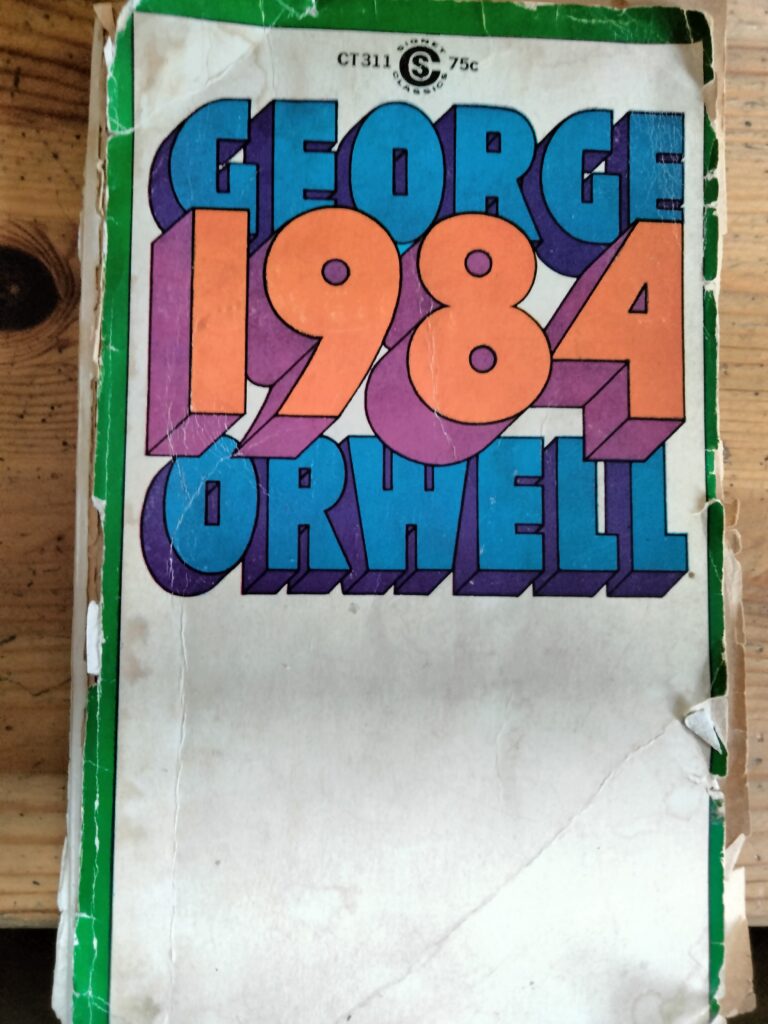Orwell’s 1984, Shockingly, is a Warning About Excessive Politicization

A few years ago, I asked a former White House official about his plans for the upcoming presidential election. He worked close to the Oval Office rather than in it. At a minimum, he must have been tempted to help his candidate get elected.
Did he expect to join his party’s campaign? No, he said. In a campaign, you are expected to say “2 + 2 equals 5.”
His words hit me like a splash of icy water. We Americans expect politicians to skirt the facts, generalize, and embroider the truth. Except for the partisans and ideologues among us, we don’t expect them to lie — to provide false information deliberately to deceive. My friend must have considered lying distasteful and even dehumanizing even, and he wanted nothing to do with it.
Re-reading 1984
I recalled this exchange while reading George Orwell’s 1984 again last month. As readers know, I am a great admirer of his. The first couple of times I read the 1949 novel, I remember thinking, This book is bleak and grim, unrelievedly so with all its talk about the secret police, Room 101, children spying on parents, and clocks striking thirteen. Indeed, 1984 is known as a dystopian novel about authoritarianism, perhaps the dystopian novel.
The reputation is undeserved because the book is not a dystopian novel or a conventional one anyway.
A dystopian novel depicts a society gripped by fear, violence, or dissatisfaction. Consider Orwell’s previous novel, Animal Farm. The pigs ruled the whole farm, not just parts of the farm and some farm animals.
By contrast, in 1984 the Party, known as IngSoc, has less power than we remember. Its stand-in, Big Brother, is not, strictly speaking, a totalitarian ruler. The Party doesn’t control eighty-five percent of the population, a working-class group known as the proles.
Why Big Brother wasn’t a totalitarian ruler
To be sure, the authorities manipulate the proles. Unlike party workers, who are controlled through pain, they are manipulated through pleasure, contra to the author of a new book on Mr. Orwell. The Party gives them prolefeed—newspapers and penny weeklies that deal in crime, sports, and non-political news. And the proles don’t protest the oppressive system Big Brother created and rules over. As Orwell notes,
So long as they (the Proles) continued to work and breed, their other activities were without importance. Left to themselves, like cattle turned loose upon the plains of Argentina, they had reverted to a style of life that appeared to be natural to them, a sort of ancestral pattern…Heavy physical work, the care of home and children, petty quarrels with neighbors, films, football, beer and above all, gambling filled up the horizon of their minds.
Yet the proles are free to an extent. They are not party members. They are not monitored by the telescreens, which is why Winston Smith and his lover, Julia, flee to prole-controlled areas for their rendezvous. And their spiritual and emotional lives are uncontaminated by the Party. As Orwell wrote,
They were not attempting to alter history. They were governed by private loyalties which they did not question. What mattered were individual relationships, and a completely helpless gesture, an embrace, a tear, a word spoken to a dying man, could have value in itself. The proles, it suddenly occurred to him, had remained in this condition. They were not loyal to a party or a country or an idea, they were loyal to one another … The proles had stayed human. They had not become hardened inside. They had held onto the primitive emotions which he himself had to relearn by conscious effort. And in thinking this he remembered, without apparent relevance, how a few weeks ago he had seen a severed hand lying on the pavement and had kicked it into the gutter as though it had been a cabbage stalk.
(Orwell had made this point about the English working class for a dozen years at least, since The Road to Wigan Pier).
The real threat 1984 warns us about
To be sure, 1984 depicts a nightmarish surveillance state in the future. Yet the book is more of a satire. It exaggerates and skewers a horrifying development in European society in the 1930s and ‘40s, a development that reached its apotheosis in Hitler’s Germany and Stalin’s Soviet Union: not only a totalitarian dictatorship but also excessive politicization.
The government, party, and the media operate on the principle of political expediency or utility. Everything—religion, civil society, family life—takes a back seat to politics. The Inner and Outer Party members worship political power, so much so they lose their ability to think properly. Staying alive becomes more important than staying human.
Of course, the Party prevents dissidents from thinking independently.
The memory holes eliminate inconvenient facts. Newspeak reduces the range of thought and consciousness and simplifies them (e.g. “double-plus-ungood”). The Ministry of Truth, or Minitrue, simplifies social discourse (“WAR IS PEACE. FREEDOM IS STRENGTH. IGNORANCE IS STRENGTH”). Two-minute hate drills reduce rationality. And the secret police arrest dissidents or freethinkers.
Is 2024 like 1984?
1984 should alarm Americans today. Who can really dispute we are excessively politicized? (The popular term is “polarization,” a species of politicization).
It has become fashionable and understandable to fear authoritarian tendencies in the Republican Party such as the January 6 riots at the Capitol. And right-wing conspiracy promoters like Alex Jones and QAnon do nothing about politicize events.
Yet the mainstream media and big tech firms have authoritarian tendencies, too; witness their treatment of the discovery of Hunter Biden’s laptop in the 2020 presidential election.
Mainstream reporters fling around the words “disinformation,” “misinformation,” and “gaslighting,” without providing proof of their claims. And the Biden administration created and maintained the Ministry of Truth-like Disinformation Governance Board, an advisory board to the United States Department of Homeland Security, until its leaders recognized their body raised constitutional problems.
The examples I cited are of different moral weight, but you get the picture.
Strangely, 1984 gives readers hope for relief from the nightmare society it portrays. In the Appendix, Orwell writes that “Newspeak was the official language of Oceania and had been devised to meet the ideological needs of Ingsoc, or English Socialism. Note the past tense. How Big Brother was defeated is left unsaid, but a close reader would assume it was the proles.
-30-

I’m not sure that I agree with the thrust of this article on Orwell’s novel, but it is thought-provoking. The proles in “Nineteen Eighty-Four” were left alone by the state because they were deemed not to matter. They seem like what Marxists call the Lumpenproletariat. They were thought incapable of contributing to society. At the same time, their vast numbers if roused to action could be dangerous so they were supplied with plenty of distractions.
Hello Matthew. Thanks for reading and for the compliment.
I agree the proles are similar to Karl Marx’s lumpenproletariat for the reasons you cite. However, I think you take your point too far; it’s a political analysis without reference to proles’ cultural and spiritual attributes, which Mr. Orwell admired if critically.
He liked the English working class’ moral conservatism and their associated institutions such as pubs and in 1984 at least, churches. While he criticized the working class’ disinterest in politics as irresponsible, he was sympathetic. He had grown up in Edwardian England and liked the freedom of rural life. His 1939 novel “Coming Up for Air” may be the best expression of his attitude. In addition, he gave two cheers to the working class in his novel “Keep the Aspidistra Flying” (1936) and in “The Road to Wigan Pier” (1937).
By contrast, his portrayals of the upper classes are bleak and negative. He described them as consumed by or corrupted by politics. For example, see his 1945 essay “Notes on Nationalism,” especially his criticism of English nationalists for failing to acknowledge Hitler’s concentration camps.